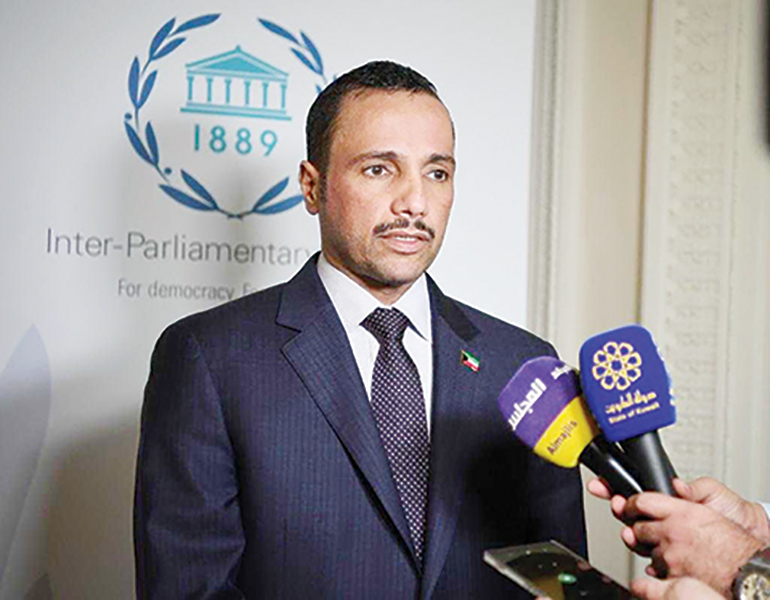

GENEVA: KuwaitNational Assembly Speaker Marzouq Al-Ghanem Friday called for amending bylaw ofInter-Parliamentary Union (IPU) in a way that imposed penalties on any memberfailing to comply with this bylaw. He was speaking to reporters after apreparatory meeting for the Fifth World Conference of Speakers of Parliament,which concluded yesterday. He said they discussed a mechanism to enforce IPU'sbylaw to bring about compliance by member countries, including abidance by UNresolutions "which were violated by some countries."
Kuwait thereforecalled on importance of amending bylaw in a way penalties are enforced on anymember country failing to abide by this bylaw, said Ghanem. The preparatorymeeting also discussed future of democracies in the world and relations betweenIPU and the UN, he said. Ghanem and Amal Al-Qubaisi, speaker of the UAEparliament, represented the Arab group in the preparatory meetings. He hopedthe conference would have fruitful outcome that would be in interest of theArab and Islamic affairs.
Meanwhile, Ghanemmet with the United Nations refugee agency's protection chief Volker Turk andthe President of the Inter-Parliamentary Union (IPU), Gabriela Cuevas Barron,in Geneva yesterday. The meeting, which was held on the sidelines of Ghanem'sparticipation in the first meeting of the Preparatory Committee for the 5thWorld Conference of Parliaments Speakers, discussed a number of issues relatedto the Commission work in the Middle East, and how the IPU can play a biggerrole by shedding light on it.
Furthermore,Ghanem held talks with his Ugandan counterpart Rebecca Kadaga on the sidelinesof the first meeting of the Preparatory Committee for the Fifth WorldConference of Speakers of Parliament. The talks focused on the parliamentarycooperation between Kuwait and Uganda and coordination of stances of the Araband African groups of states on the agenda topics of the committee meeting.Ghanem represents the Arab geopolitical group of states at the meeting whileKadaga represents the African one. Separately, Ghanem held a meeting with hisCypriot counterpart Demetris Syllouris, as they discussed coordination ofstances on issues that would be addressed at the international convention.
In the meantime,Ghanem visited the Permanent Mission of the State of Kuwait to the UnitedNations Office and other international organizations in Geneva where he waswelcomed by Head of the Mission Jamal Al-Ghunaim and other members of themission. He appreciated the great efforts being made by the mission to affirmKuwait's presence at, and effective contribution to, the various activities ofthe Geneva-based international organizations.
Later yesterday,Ghanem arrived in Cairo to take part in a scheduled joint meeting of the ArabParliament and chairs of the Arab parliaments, in response to an invitation bythe Arab Parliament President Dr Meshaal Al-Salami. His delegation includes MPsAli Al-Deqbasi, Askar Al-Enezi, Mohammad Al-Huwailah and Khaled Al-Otaibi. Theywere welcomed upon arrival by the State of Kuwait Ambassador to Egypt MohammadAl-Dhuwaikh, the Kuwaiti Permanent Delegate at the Arab League Ambassador AhmadAl-Bakr and a number of diplomats. The speaker flew in from Geneva, where hewas seen off by Ghunaim and members of the Kuwaiti mission. The third sessionof the second legislative term of the Arab Parliament is scheduled on February10-12.
Salami had statedthat getting countries in the region on the same page could be achieved throughan 'all-encompassing vision' that aims to keep collective security intact.Solidarity among Arab nations is needed to stave off any 'foreign meddling'that can be detrimental to their interests, Salami said amid high-level talksbringing together top lawmakers and officials from around the region. Hepinpointed the Israeli-Palestinian conflict as the most 'perennial concern,' inaddition to other Arab countries enmeshed in political and economic turmoil,naming Lebanon as a case in point.
On the challengesfacing the region, the Arab world's top lawmaker cited unemployment as alingering dilemma, besides other crucial sectors such as healthcare andeducation. He went on to say that a key objective in the talks is to ensurethat Arab nations remain a cohesive unit in the face of these growingchallenges, particularly at this critical juncture. Some of the Arab region'smost notable and influential officials have turned up for the meeting, makingthe talks all the more significant. - KUNA

